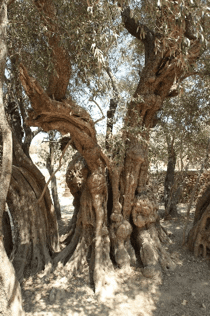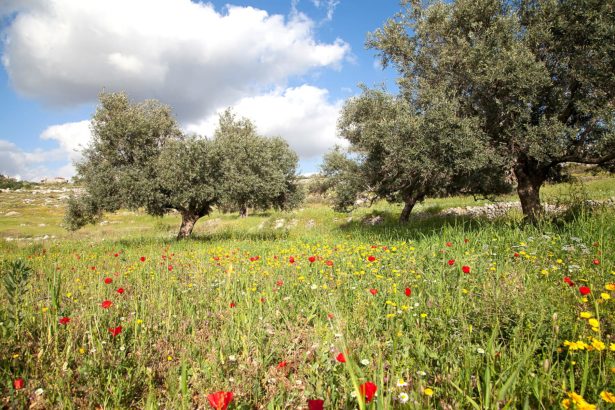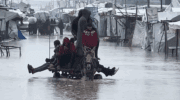Around 800 000 Palestinian olive trees have been uprooted since 1967. The effects on the economy are disastrous. Moreover to the Palestinian people it is deeply offensive: the cultivation these strong, resilient trees have become part of their identity.
A Palestinian American reminisces about growing up under occupation, learning to treasure land, home, and family above all else. The olive tree is a sacred part of the land, and it has come to represent the Palestinian struggle for dignity. Ahed Tamimi’s struggle too, is the struggle of all Palestinians.
By Wasan Abu Baker
Dear Ahed Tamimi, I would like to dedicate this article to you. Sending you love and Solidarity, We Stand with you and with all Palestinian Prisoners.
(If you pull out an olive tree from my land, I’ll plant a hundred olive trees in return, and that’s my heroic motto).
After my father’s release from the Negev prison in 1988, our family, friends, and neighbors had a huge celebration welcoming him home. He spent a few months as a political prisoner in the harsh Negev prison. I was so happy to have him home, as a 7-year-old it was terrible to have my father away from us for such a long time. At first, we couldn’t recognize my father with a big beard and my little sister and brother were scared of the strange man embracing our mother.
Life was mostly normal after that, normal for a Palestinian family resisting occupation that is. Our lives were always interrupted with road closures, demonstrations, targeting of political activists some of which were my classmates, neighbors, relatives, and friends, and all kinds of restrictions on Palestinian life.
Through all this my parents were determined to give their children a decent life. They struggled complete the construction of our family home which, in my culture, is the best way to guarantee a future for your family. There is a feeling that all you need is your land and home, and you can survive anything. Therefore, the confiscation of land and destruction of home in Palestine by the Israeli Occupation is one of the harshest ways that they attempt to break the will of the people. But the people continue to struggle to keep their land, plant their olive trees, grow their families, and build their homes.
Growing up, my father always encouraged us to be brave and not fear anything. I didn’t understand how important this was, but now I understand that being in a place where you have to struggle just to survive and have a voice you must be courageous. There are many “children of the stone” like me, children who grew up through the first Palestinian Intifada of 1987 and learned to face a force intent on destroying your way of life. The Palestinian struggle was keen on making the people aware of their human rights. It also encouraged them to stand up to oppression and defend their rights.
My dad was born before the war of 1948. He lost his father at a young age, and my grandmother, at the age of 18, had to raise four children on her own. She had nothing but her children and the land she inherited from my grandfather as the main source of income. She used the land to plant an olive orchard and make a life for her and her children. The olive tree is an important part of Palestinian heritage because it has guaranteed a life for those who took care of the trees.
As a young girl, my father would tell me the history of the olive tree and how the Romans brought it to Palestine when they ruled here. And Palestinians have adopted the olive tree as a symbol of their attachment to their land. This tree is a resilient tree and likewise, the Palestinians draw their strength from its strong roots and resilience. The olive harvest season in October bears socio-cultural meaning where families come together to harvest the trees. I still remember those days when we came home from school and then going out to the field to pick the olives, then coming back home to finish our homework. After the harvest is complete we would take the olives to our family factory where the olives are pressed to make olive oil. I remember standing next to my dad to have a taste of the freshest olive oil along with my pita bread. He used to say that once you drink olive oil it becomes part of your soul. I will never forget and miss always miss the smell of olives on those days.
Every day, my father took us to work on our ancestral land. Taking care of olive trees or just walking around on the land. I remember on our walks seeing only settlements in the distance and my father recalling how he would visit that distant land to visit relatives as a child. As a child myself, I would ask questions about who were there now and why can’t go there to play where he used to play, but he had no answers to give. He would tell me more stories about the olive trees and their connection with the people of Palestine and all the civilizations that governed it over the ages.
The olive Tree is a sacred tree and has been mentioned in the three holy books of the Abrahamic faiths; Quran, Bible, and Torah. Prophet Mohammad (pbuh) taught the importance of this tree in providing food and medicine. Palestinians also take pride in that arguably the oldest olive tree in the world, Al Badawi, is found in Al Walaja which is a small town within the municipality of Bethlehem.
 The years have passed, and our trees have grown, towering with strength and dignity. Bringing a larger olive harvest every year. I returned to visit Palestine and my three children from America in December 2017, and they saw in their own eyes the presence of olive trees as a sign of our heritage.
The years have passed, and our trees have grown, towering with strength and dignity. Bringing a larger olive harvest every year. I returned to visit Palestine and my three children from America in December 2017, and they saw in their own eyes the presence of olive trees as a sign of our heritage.
Unfortunately, our visit coincided with President Trump making a decision which could deprive Palestinians of claiming Jerusalem as their capital of Palestine. A city which has been at the root of Palestinian heritage for hundreds and thousands of years. While we were there, the events unfolded rapidly with marches and demonstrations condemning this US decision. There were, as always violations of Palestinian rights which led to the arrest of Ahed Tamimi and her mother, Nariman Tamimi. Ahed is a Palestinian child born on the land of the village of Nabi Saleh in Palestine. She loved her family and her land and reminded me of myself when I was a little girl. She, like me, was taught the significance of our Palestinian heritage and the importance of the olive tree in Palestine. Ahed Tamimi realized that the extraction of the olive tree from its soil was more like grabbing a child from its mother’s lap. The olive trees in Palestine tells our people’s history and needs to reach the ears of the whole world, it is a tale of a people ready to sacrifice everything for their land. A people ready to die with dignity like the olive tree, rather than live in humiliation.
Wasan Abu-Baker is an American Activist with a Palestinian Origin. She is the Vice Chair of Corpus Christi National Justice for our Neighbors in Corpus Christi,Texas, a member of ABCD New addition Team, and a staff writer for Kings River Life Magazine in the US. Wasan has also published articles in Muslim Vibes in the U. K., as well as some other newspapers. She is an educator and a teacher who loves teaching Muslim kids Islam and Arabic integrating the arts and helping them build their Islamic identity in the US. Wasan also finished her fellowship with American Friends Service Committee in California and. was on the staff of Fresno interdenominational refugee ministry that serves refugees in Fresno, California when she lived in Fresno. Wasan Earned her master’s degree in special education and graduated from St. John Fisher College in Rochester, New York.




